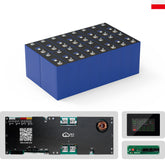Does It Matter Which Battery You Use in a Lawn Mower
If you're wondering "Does it matter which battery you use in a lawn mower?", the short answer is yes—it definitely does. The type, voltage, size, and chemistry of the battery in your lawn mower can significantly affect performance, run time, charging efficiency, and even the lifespan of the mower itself. Choosing the wrong battery could lead to underpowered performance or even damage to your equipment.
- How the Right Battery Impacts Lawn Mower Performance
- Battery Types Used in Lawn Mowers
- Battery Voltage and Why It Matters
- Understanding Amp-Hours in a Lawn Mower Battery
- Lawn Mower Compatibility and Battery Brands
- Battery Charger Compatibility
- Maintaining Your Lawn Mower Battery
- Signs You Need a New Lawn Mower Battery
- How to Choose the Right Lawn Mower Battery
- Cost Comparison of Lawn Mower Battery Options
- Environmental Impact of Lawn Mower Batteries
- Comparing Lawn Mower Battery Brands
- Battery Safety Tips for Lawn Mower Owners
- Pros and Cons of Electric Lawn Mowers and Their Batteries
- Expert Tips on Extending Battery Life
- Yes, It Absolutely Matters Which Battery You Use in a Lawn Mower
In this article, we’ll break down everything you need to know about selecting the right battery for your lawn mower, explore the types available, and help you understand how the right choice can improve your mowing experience.
How the Right Battery Impacts Lawn Mower Performance
Power Output and Lawn Size
The power output of a battery determines how efficiently your mower can handle different lawn conditions. A weaker battery may be fine for short grass on a small lawn, but if you're tackling tall or thick grass, a higher capacity and higher voltage battery is often required.
Runtime and Recharging
One of the most common complaints with battery-powered mowers is short runtime. A quality battery with the correct amp-hour (Ah) rating ensures longer mowing sessions and fewer interruptions for charging.
Startup Power and Torque
Some lawn mowers require a surge of power at startup, especially self-propelled or electric-ignition models. Using a low-output battery may cause startup failure or lead to stalling mid-use.
>>See also What is the Difference Between a Dual Battery and an Auxiliary Battery
Battery Types Used in Lawn Mowers
Lead-Acid vs. Lithium-Ion Batteries
The two main types of batteries found in lawn mowers are lead-acid and lithium-ion. Here’s how they compare:
Lead-Acid Battery
Older technology
Heavier and bulkier
Lower cost
Shorter lifespan
Slower charging
Lithium-Ion Battery
Lightweight
Higher energy density
Longer life cycle
Faster charging
Higher cost but better value over time
Which One Is Better for You?
For most homeowners, a lithium-ion battery offers a better long-term solution. They deliver more consistent power output and require less maintenance. However, if you’re using a riding mower or have a limited budget, lead-acid might be a viable option.
Battery Voltage and Why It Matters
Common Voltage Ratings
Battery-powered lawn mowers typically use batteries with voltages like:
12V,18V,20V,40V,56V,80V,100V+
The higher the voltage, the more power the battery can deliver, which is particularly important for handling thicker grass or larger lawns.
Matching Voltage With Mower Requirements
It’s crucial to match the battery voltage with what your mower was designed to handle. Over-volting can damage circuits, while under-volting will result in poor performance or the mower not working at all.
Understanding Amp-Hours in a Lawn Mower Battery
What Are Amp-Hours?
Amp-hours (Ah) tell you how much energy a battery can store. A 5Ah battery will last twice as long as a 2.5Ah battery under the same load. When choosing a battery, balancing voltage and Ah is key to maximizing both performance and duration.
Do More Amp-Hours Mean Better Performance?
Not necessarily. A higher Ah rating means longer runtime, but it doesn’t increase cutting power. Make sure you choose a battery that meets both your power and runtime needs.
Lawn Mower Compatibility and Battery Brands
OEM vs. Universal Batteries
OEM (original equipment manufacturer) batteries are designed specifically for your mower's make and model. While more expensive, they offer guaranteed compatibility and often better performance.
Universal batteries can sometimes work across multiple brands but may not fit perfectly or perform optimally.
Battery Systems Across Brands
Brands like Ryobi, Greenworks, and EGO offer complete tool ecosystems using the same battery system. If you already have other tools from one brand, sticking with it can save money and simplify charging.
Battery Charger Compatibility
Smart Chargers and Safety
Most modern battery systems include smart chargers that prevent overcharging and overheating. Using a charger not designed for your battery can pose a safety risk or degrade performance.
Charging Times
Charging times vary by battery type and charger size. Fast chargers can recharge lithium-ion batteries in 30–60 minutes, while older chargers for lead-acid batteries might take several hours.
Maintaining Your Lawn Mower Battery
Storage Tips
Proper storage of your battery during the off-season can significantly increase its lifespan. Always:
Store in a cool, dry place
Avoid freezing temperatures
Keep away from direct sunlight
Store at 40–60% charge if unused for long periods
Cleaning and Inspection
Regularly check your battery for corrosion, damage, or bulging. Clean contacts with a dry cloth to maintain good conductivity.
Signs You Need a New Lawn Mower Battery
Declining Performance
If your battery doesn't hold a charge as long as it used to or your mower struggles to start, it may be time for a replacement.
Physical Wear and Age
Lithium-ion batteries generally last 3–5 years or 300–500 charge cycles. Lead-acid versions may need replacement sooner, especially if not maintained properly.
How to Choose the Right Lawn Mower Battery
Check Manufacturer Specifications
Always start by consulting your mower's manual for approved battery types, voltages, and Ah ratings.
Assess Your Mowing Habits
Small yard, light use: Lower Ah, mid-range voltage
Large yard, frequent use: Higher Ah, higher voltage
Self-propelled models: High torque, higher voltage preferred
Cost Comparison of Lawn Mower Battery Options
Upfront vs. Long-Term Cost
A lead-acid battery may cost less upfront, but frequent replacements and maintenance add up. Lithium-ion batteries cost more initially but usually last longer and require less care.
Value Based on Usage
If you mow frequently, investing in a higher-quality battery can pay off quickly in reliability, runtime, and convenience.
Environmental Impact of Lawn Mower Batteries
Recycling Programs
Most local recycling centers or hardware stores offer recycling programs for old batteries. Never throw batteries in the trash—they can leak toxic chemicals and damage the environment.
Energy Efficiency
Lithium-ion batteries are more energy-efficient during charging and usage, reducing overall power consumption compared to their lead-acid counterparts.
Comparing Lawn Mower Battery Brands
|
Brand |
Battery Type |
Voltage Options |
Known For |
|
EGO |
Lithium-ion |
56V |
Long runtime, quick charging |
|
Greenworks |
Lithium-ion |
24V to 80V |
Versatile tool ecosystem |
|
Ryobi |
Lithium-ion |
18V to 40V |
Budget-friendly |
|
DEWALT |
Lithium-ion |
20V and 60V |
Durable construction |
|
Toro |
Lead-acid/Lithium |
60V |
Reliable residential mowers |
Choosing a battery from a reputable brand ensures quality, safety, and compatibility.
Battery Safety Tips for Lawn Mower Owners
General Safety Guidelines
Never charge a damaged battery
Keep away from water or extreme heat
Use only approved chargers
Don’t store near flammable materials
Emergency Preparedness
In case of a battery fire or overheating, don’t use water. Use a Class D fire extinguisher or move the battery to a safe, ventilated area.
Pros and Cons of Electric Lawn Mowers and Their Batteries
Pros
Eco-friendly
Low noise
Low maintenance
Easy to start
No fuel storage needed
Cons
Limited runtime
Dependence on battery health
Higher upfront cost for quality models
Still, for most homeowners, the benefits of using a quality battery in an electric mower outweigh the drawbacks.
>>See also How Lithium Batteries Affect Golf Cart Speed
Expert Tips on Extending Battery Life
Avoid Full Discharge
Frequent deep discharges can shorten your battery life. Aim to recharge before dropping below 20%.
Use Mower at Optimal Settings
Use eco or low-power modes on your mower when possible. This reduces the current draw and extends your battery’s runtime.
Yes, It Absolutely Matters Which Battery You Use in a Lawn Mower
To wrap things up: does it matter which battery you use in a lawn mower? Absolutely. The right battery improves performance, increases runtime, ensures safety, and protects your investment in your equipment. From voltage and capacity to brand compatibility and maintenance, every factor plays a role in how well your mower performs.
So before your next mow, take a few minutes to ensure your battery is the right one for the job. It’ll save you time, money, and frustration in the long run.
























Leave a comment
All blog comments are checked prior to publishing